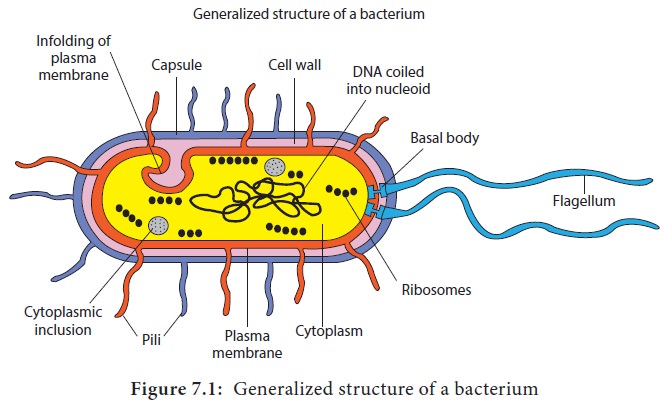Chapter: 11th Microbiology : Chapter 7 : Morphology of Bacteria
Morphology of Bacteria
Morphology
of Bacteria
Living organisms are differentiated from non living matter by
their (1) ability to reproduce (2) ability to ingest or assimilate food and
metabolize them for energy and growth (3) ability to excrete waste products (4)
ability to react to changes in their environment (irritability) and (5) susceptibility
to mutation. The living organisms include a variety of micro and macro
organisms of different size, shape, morphology and behaviour. They include tiny
bacteria, protozoans, worms, plants and animals.

Bacteria, cyanobacteria (blue green algae) microalgae, protozoa,
yeasts and fungi represent the microorganisms. Prokaryotes are organisms with
primitive type of nucleus lacking a well defined membrane (Figure 7.1). The
nuclear material is a DNA molecule in prokaryotes compared to chromosomes of
higher organisms. Eukaryotes are organisms with cells having true nuclei
enclosed in a nuclear membrane and are structurally more complex than
prokaryotes. There exists varying degree of localization of cellular functions
in eukaryotes that occur in distinct membrane bound intracellular organelles
like nuclei, mitochondria, chloroplasts. The cells of living organisms are
either prokaryotic or eukaryotic in nature and there is not any intermediate
condition. The size, shape, morphology and the internal cellular organizations
are different in these two groups.
Satisfactory criteria to differentiate bacteria, fungi and algae
could not be made until the development of electron microscope, which depicted
the internal structure of these organisms. The absence of membrane bound
internal structures in bacteria and their presence in fungi, algae, protozoa,
plant and animal cells was taken as criterion to differentiate prokaryotes and
eukaryotes.
Related Topics